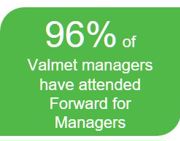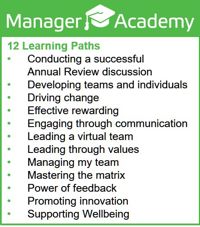An inside look at how Valmet develops its managers
May 17, 2017
Valmet has been systematically developing its managers since becoming an independent company in 2014. The framework for how we develop our managers was created based on the manager role and values.
Manager role at the core

“Spending the day with a group of other Valmet managers allowed me to see other management styles at work,” says Bill Crichton from Valmet in North America. “Seeing another’s approach to resolving issues during the game scenarios reminded me that there are several different approaches that can be successful in resolving issues.” The training gave managers the tools to use best practices for communication, with emphasis on telling the Valmet story. “I try to ensure the team fully understands what we are up against in the way of goals and targets, as well as competition and constraints. Why the vision is what it is. Then, I can provide the framework for the future state and the individual’s role in achieving it,” Bill emphasizes.
ManagerAcademy tailors learning
To complement Forward for Manager’s face to face learning approach, Valmet launched a new virtual learning environment known as ManagerAcademy at the start of 2016. ManagerAcademy contains 12 learning paths with a variety of learning elements (quizzes, interactive sessions, videos, tasks and more) – each designed to strengthen an aspect of the manager role. All managers are tasked with completing three learning paths per year as part of their individual development plans.
“ManagerAcademy allows us to sharpen our managerial skills in the areas we need it most. We all have areas to develop to become better managers, whether they relate to communication, rewarding, team development, driving change or another topic. By becoming better managers, we make Valmet a better company,” says Hanna Heikkilä, head of talent management at Valmet.

Manager feedback
Valmet has various ways to provide manager feedback including the annual and mid-year review discussions, OurVoice engagement survey, and Valmet 360. Valmet 360 is specifically designed to evaluate how well a manager carries out the manager role and acts according to our values. Valmet has recently started a 360 push where half of its managers will receive 360 feedback over the next two years.
“We’re taking a very practical approach to developing our managerial skills – and there is more to come. Our recent engagement survey shows we’re making progress but also highlights the areas in which we need to continue to focus. As companies change and develop, so too will the skills needed to lead them – and we’re continuously working to come up with something new,” concludes Hanna Heikkilä.
The local touch
Global initiatives are intended to be complemented locally, adding impact through a local touch. The team in Indonesia incorporates a ManagerAcademy sharing session in every management team meeting, where a manager explains his/her learning insights from one of the learning paths which is then followed by a 20-minute group discussion. The same is done in China where they also organize special learning sessions for manager’s who have limited English skills, so they too can benefit from the content.
Another local practice has been to create follow up learning material for some of the ManagerAcademy learning paths as a way to emphasize their importance locally. This way allowed India to focus on the power of feedback and South America on mastering the matrix – areas that were locally seen as especially important.
Read the next story: Lean bring results in Portugal